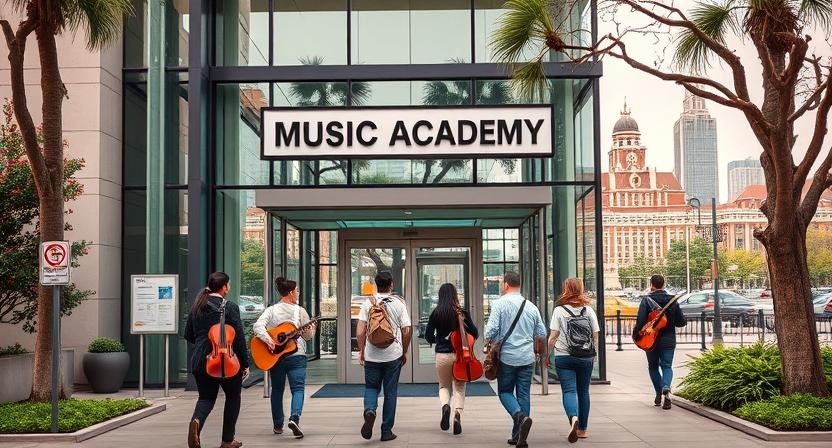Establishing a music academy is a commendable endeavour that fosters cultural enrichment and personal development within a community. However, the success of such an institution heavily relies on its location. Choosing the right location for your music academy involves a meticulous evaluation of various factors to ensure accessibility, visibility, and sustainability. This comprehensive guide delves into the critical aspects to consider when selecting a location for your music academy, common pitfalls to avoid, and highlights Indian cities with a burgeoning demand for music education.
Factors to Consider When Choosing a Right Location for Your Music Academy
Choosing the right location for your music academy is one of the most important decisions that can shape your success. From accessibility to safety and neighbourhood atmosphere, every factor plays a key role in attracting and retaining students.
1. Demographics
Understanding the demographic profile of a potential location is paramount. Areas with a high concentration of families with children are ideal, as parents often seek extracurricular activities like music lessons for their offspring. Additionally, regions with a higher median income are more likely to afford private music education. Educational attainment levels also play a role; communities that value education may show greater interest in cultural pursuits such as music.
2. Competition
Analysing the existing competition provides insights into market saturation and demand. An area devoid of music schools might indicate an untapped market or a lack of interest. Conversely, a region with numerous academies could suggest high demand but also intense competition. Identifying a balance is crucial.
3. Accessibility
The right location for a music academy should be convenient for students of all ages, with easy access to transport.. Proximity to public transit, ample parking facilities, and safe pedestrian pathways enhance convenience for students and parents, thereby increasing enrolment potential.
Your Music Academy on Google
It’s very important to get your music academy’s location listed on Google. When your institute appears on Google Maps and search results, it becomes easier for potential students and parents to find you, contact you, and trust your brand. You can do this easily using Google Business Profile, a free tool that lets you manage how your business appears on Google Search and Maps.
4. Visibility and Foot Traffic
A location with high visibility and foot traffic can serve as free advertising. Being situated in bustling areas like shopping districts or near schools can attract spontaneous inquiries and boost enrolment.
5. Facilities and Infrastructure
The physical space should accommodate classrooms, practice rooms, and performance areas. Soundproofing, acoustics, and adequate lighting are essential considerations. Additionally, compliance with local building codes and accessibility standards ensures a safe and inclusive environment.
6. Cost and Budget
Balancing the ideal location with financial feasibility is crucial. Urban centers may offer greater visibility but come with higher costs. Conversely, suburban or rural areas might be more affordable but could limit accessibility. Conducting a cost-benefit analysis helps in making an informed decision.
7. Local Culture and Community Support
Establishing an academy in a community that values arts and culture can lead to better support and collaboration opportunities. Engaging with local schools, community centers, and cultural organizations can foster partnerships and enhance the academy’s reputation.
8. Safety and Environment
A safe and welcoming environment is paramount for students and their families. Low crime rates, well-lit surroundings, and a clean neighbourhood contribute to a positive perception of the academy.
9. Future Development Plans
Researching municipal plans for future development can provide insights into the long-term viability of the location. Upcoming residential projects, commercial developments, or infrastructure improvements can influence the academy’s growth prospects.
10. Technological Infrastructure
In the digital age, a robust technological infrastructure is vital. Reliable internet connectivity supports online classes, virtual collaborations, and digital marketing efforts, expanding the academy’s reach beyond geographical limitations.
Common Mistakes When Choosing a Location
Many institute owners focus only on appearance or price while ignoring the most important factors like parking, sound disturbance, or student convenience. Avoiding these common mistakes can save you from future problems and ensure the right location for your music academy supports long-term growth.

1. Overlooking Market Research
Neglecting comprehensive market research can lead to misguided decisions. Understanding the target audience, their needs, and preferences is foundational to selecting an appropriate location.
2. Focusing Solely on Cost
While budget constraints are real, choosing a location based solely on affordability can be detrimental. Compromising on essential factors like accessibility, safety, or visibility may hinder the academy’s success.
3. Ignoring Zoning Regulations
Each locality has specific zoning laws that dictate permissible business operations. Failing to adhere to these regulations can result in legal complications and operational disruptions.
4. Underestimating Noise Levels
Music academies require a conducive environment for learning. Locations adjacent to noisy establishments or busy roads can interfere with lessons and deter potential students.
You might be also want read: Free Checklist: 10 Factors to Consider Before Renting a Space for Your Music Institute
5. Neglecting Growth Potential
Selecting a space that meets current needs but lacks room for expansion can be short-sighted. Anticipating future growth and choosing a location that can accommodate it prevents the need for costly relocations.
6. Disregarding Community Fit
Establishing an academy in a community that doesn’t value music education can lead to low enrolment. Aligning the academy’s mission with the community’s interests fosters mutual support and success.
7. Lack of Parking Facilities
Insufficient parking can be a significant deterrent for students and parents. Ensuring adequate and safe parking options enhances convenience and satisfaction.
8. Poor Building Condition
Choosing a location with structural issues, inadequate facilities, or poor aesthetics can negatively impact the academy’s image. Investing in a well-maintained space reflects professionalism and care.
9. Ignoring Competitor Analysis
Failing to assess the presence and strength of competitors can lead to market saturation. Understanding the competitive landscape aids in differentiating the academy’s offerings.
10. Overestimating Demand
Assuming a high demand without empirical evidence can result in unmet expectations. Conducting surveys, focus groups, or feasibility studies provides a realistic picture of potential enrollment.
Cities in India with High Demand for Music Institutes
India’s rich musical heritage and evolving contemporary scene have led to a growing demand for quality music education across various cities. Choosing the right location for your music academy in these urban centers can greatly improve your visibility, student reach, and long-term success.
Mumbai
As the heart of India’s entertainment industry, Mumbai offers unparalleled opportunities for aspiring musicians. The city’s vibrant music scene encompasses Bollywood, indie music, and classical traditions, attracting a diverse student base. Institutions like the True School of Music have thrived here, indicating a robust demand for music education.
Delhi
The capital city boasts a rich cultural tapestry with a blend of traditional and modern musical influences. Delhi’s diverse population and status as an educational hub make it a right location for your music academy. The presence of institutions like the Global Music Institute underscores the city’s commitment to music education.
Bengaluru
Known for its cosmopolitan culture and thriving tech industry, Bengaluru has a youthful demographic with a keen interest in music. The city’s openness to various music genres and numerous live music venues create a conducive environment for a music academy. Institutions like the Swarnabhoomi Academy of Music have contributed to the city’s musical landscape.
Chennai
Renowned as the cultural capital of South India, Chennai has a deep-rooted tradition in Carnatic music and Bharatanatyam dance. The city’s annual Madras Music Season attracts artists and enthusiasts globally, reflecting a strong appreciation for music. Establishing an academy here can tap into this rich cultural milieu.
Kolkata
With a legacy of producing legendary musicians and a populace that deeply values the arts, Kolkata presents a fertile ground for music education. The city’s cultural festivals and events provide platforms for students to showcase their talents. The Calcutta School of Music stands as a testament to the city’s musical inclinations.
Pune
Emerging as an educational hub, Pune has a youthful population with a growing interest in music. The city’s blend of traditional and modern lifestyles creates a dynamic environment for a music academy. Proximity to Mumbai also offers additional opportunities for collaborations and performances.
Hyderabad
Hyderabad’s burgeoning IT industry has attracted a diverse population, leading to an increased demand for varied cultural and educational activities, including music. The city’s mix of traditional and contemporary music scenes provides a balanced platform for a music academy.
Ahmedabad
As a rapidly developing city with a rich cultural heritage, Ahmedabad has shown a growing interest in music education. The city’s numerous cultural festivals and events indicate an engaged community supportive of the arts.
Jaipur
Known for its royal heritage and vibrant arts scene, Jaipur has a deep appreciation for music and dance. The city’s tourism industry also offers opportunities for cultural performances, making it a strategic location for a music academy.
Lucknow
With a historical association with classical music and dance, Lucknow’s cultural landscape provides a conducive environment for music education. The city’s commitment to preserving and promoting the arts can benefit a new music academy.
When considering these cities, it’s essential to conduct localized market research to understand specific demographics, competition, and community interests. Aligning the academy’s offerings with the cultural fabric and musical preferences of the chosen city can significantly enhance its success and sustainability.
Selecting the right location for your music academy is a multifaceted process that demands thorough research and strategic planning. By carefully evaluating factors such as demographics, competition, accessibility, and cultural alignment, and by learning from common pitfalls, you can position your academy for long-term success. Cities like Mumbai, Delhi, Bengaluru, and others highlighted above offer promising opportunities due to their vibrant musical landscapes and growing demand for quality music education. Ultimately, a well-chosen location not only enhances the academy’s growth prospects but also contributes to the cultural enrichment of the community it serves.


